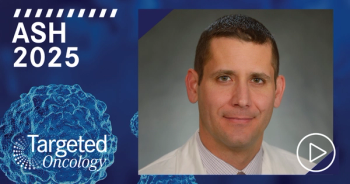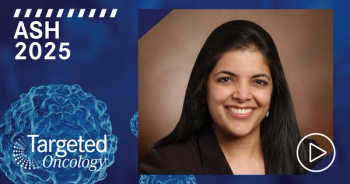
Immune System Plays Important Role in CAR T Cell Responses in Glioblastoma Models
Chimeric antigen receptor T-cell therapy mediates antigen-dependent and -independent antitumor effects, and CAR T-cell activation of host antitumor immunity is critical for productive solid tumor CAR T immunotherapy.
Chimeric antigen receptor (CAR) T-cell therapy mediates antigen-dependent and
-independent antitumor effects, and CAR T-cell activation of host antitumor immunity is critical for productive solid tumor CAR T immunotherapy, according to findings from laboratory studies presented by Christine E. Brown, PhD, at the virtual American Association of Cancer Research (AACR) Annual Meeting 2021.
Findings from the analyses show that CAR T-cell may be able to transform the tumor microenvironment to elicit anti-tumor immunity in solid tumors.
Brown, the deputy director of the T cell Therapeutic Research Laboratory at Beckman Research Institute of City of Hope, and her colleagues analyzed the role of the endogenous immune system in productive CAR T-cell responses and if CAR T cells can promote endogenous immunity in mouse models of glioblastoma treated with CAR T-cell therapy. They found that polyclonal immune responses could potentially be generated by productive CAR T cell–mediated induction to address tumor heterogeneity and immunological memory to reduce the potential for tumor relapse.
The investigation of CAR T cells for patients with glioblastoma started after Brown, et al, wrote a case report on a patient with recurrent, multifocal glioblastoma who experienced a complete response after treatment with CAR T therapy. The patient achieved this response despite having target antigen heterogeneity; some parts of the patient’s tumor expressed low or negative levels of interleukin-13 receptor alpha 2 (IL13Rα2), but other parts expressed medium or high levels. The investigators explored the idea of whether there was a chance CAR T cells led to the activation of the patients host immune system, according to Brown.
“Consistent with this notion, we found that after each CAR T-cell infusion, we saw an increase in immune cells into the cerebral spinal fluid. While CAR T cells were detected, the majority of these immune cells were from the host immune system showing endogenous CD3 and CD14 myeloid population,” Brown explained.
In addition to the endogenous immune cells, Brown said there were also spikes of inflammatory cytokines that coincided with each infusion of CAR T cells. The investigators concluded that CAR T cells could potentially change the landscape of glioblastoma and other solid tumors.
This line of investigation inspired Darya Alizadeh, PhD, another investigator on the case report, to look at CAR T therapy and host antitumor immunity in co-culture assays. Alizadeh looked at responses to CAR T-cell therapy before and after patient’s treatment. By isolating CD3 cells in patient’s blood before and after therapy, she observed that T cells isolated after treatment had greater reactivity. This was demonstrated by greater proliferative potential on the autologous tumor, greater interferon gamma (IFNγ) production, and the ability to target and kill the patient’s tumor.
These observations led to Alizadeh and her colleagues creating an immunocompetent mouse model of glioblastoma to further investigate the connection between CAR T cells and the host immune system. They looked at murine IL13Rα2-CAR and a murine CAR T-cell production platform to show they could engineer murine CAR T cells to express the CAR with a balanced CD4 and CD8 ratio, Brown said. The murine CAR T cells demonstrated IL13Rα2-dependent killing and cytokine production.
The investigators looked at several syngeneic murine models, and one that stood out was the KR158, which grows in a highly invasive and aggressive manner, according to Brown. It expresses high myeloid cell infiltrates and a T cell-excluded phenotype; features which the investigators felt were consistent with human clinical glioblastoma.
After choosing the design, the investigators looked at the ability of IL13Rα2-targeted CAR T cells to target glioblastoma in the syngeneic mouse model and demonstrated that a single infusion of these CAR T cells could produce long-term survival in the majority of mice.
To understand the role of endogenous immune system in the antitumor response, the investigators compared activity in immune-competent mice with activity in immune-compromised mice.
“To our surprise, we saw that CAR T cells mediated superior antitumor responses in immune-competent mouse models, suggesting that CAR T cells may stimulate an endogenous T-cell response or antitumor response,” Brown said.
The investigators used cured mice from the immune-competent models and rechallenged them with antigen negative tumors to test this hypothesis. The cured mice exhibited host antitumor immunity and rejected antigen negative tumors after CAR T-cell therapy, which suggested the investigators were inducing new CAR T-cell responses or tumor reactivity.
After seeing these results, the investigators then isolated endogenous T cells from mice with untreated tumors and compared them with endogenous T cells from mice who received CAR T-cell treatment. In vitro co-culture assays showed that endogenous T cells from mice treated with CAR T cells had greater tumor reactivity in a tumor killing assay and T cell proliferation assay.
“This is really important because it suggests that antitumor reactivity by the host immune system isn’t just due to exposure to the tumor itself but really relied on CAR T-cell treatment and led us to studies to understand what’s changing in the microenvironment,” Brown stated.
Using congenic mouse strains CD45.1 and CD45.2 to differentiate adoptively transferred T cells and endogenous T cells, respectively, Alizadeh and the other investigators looked at the changes in the T cell compartment after CAR T-cell therapy. When the CAR T cells were adoptively transferred, they became activated and proliferated, which was shown by the Ki67, CD69, and GZMB-positive T cell counts, which Brown said was to be expected. Mice who were given CAR T cells also had stimulated endogenous T cell activation in the tumor microenvironment after treatment.
The resident myeloid activation in glioblastoma was induced with CAR T-cell therapy in major histocompatibility complex class I and II. There was greater activation with CAR T in these myeloid populations, shown by CD86-positive myeloid cells and IFNγ-positive myeloid cells.
Single-cell RNA sequencing showed that myeloid populations upregulated the expression of genes associated with antigen presentation, Brown said. There was also an increase in the expression of IFNγ stimulation.
Because of these findings, the investigators looked at the role of IFNγ in these responses. They analyzed IFNγ receptor knockout host mice using wild-type CAR T cells and wild-type tumor cells and models that did not respond to IFNγ in the tumor microenvironment. They observed that the host immune cells lacked the ability to respond to IFNγ; those mice had a worse response to CAR T cells, according to Brown.
“Productive CAR T-cell therapy required that the immune landscape or the immune cells within the tumor responded to IFNγ,” Brown said. “When they didn’t, we saw decreased activation of myeloid cells within the tumor and decreased activation of host T cell populations.”
Through induction of endogenous antitumor immunity, investigators hypothesize that challenges with CAR T-cell therapy for solid tumor can be overcome.
“What we’ve shown is that in productive CAR T-cell therapy in solid tumors, not only is antigen-dependent killing important, but we believe the indirect effects, mediated through the production of IFNγ, the stimulation of resident macrophages, and induction of endogenous T cells is also very critical in this response,” Brown concluded.
Reference:
Brown CE, Alizadeh D, Jonsson V, et al. CAR T cell therapy reshapes the tumor microenvironment to promote host antitumor immune responses in glioblastoma. Poster presented at: American Association of Cancer Research (AACR) Annual Meeting 2021; April 9-14, 2021; virtual. https://bit.ly/3v79JaX. Accessed April 15, 2021.




















